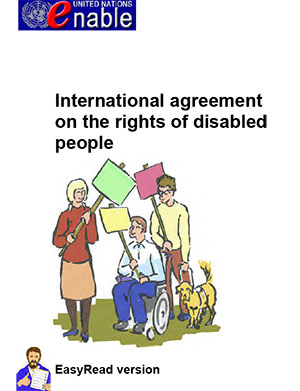UNITED NATIONS CONVENTION ON THE RIGHTS OF PERSONS WITH DISABILITIES (UNCRPD)
People First operates from two guiding documents:
1) The Canadian Charter of Rights and Freedoms
2) The United Nations Convention on the Rights of Persons with Disabilities.
These documents protect and promote the rights of people with disabilities in our society. They protect our rights to education, to employment, to live where we choose, and to have enough supports to live independently, to have enough income to live with dignity, and to be involved in the community.
WHAT IS THE UNCRPD?
The Convention is an agreement between countries to obey the same law about specific issues. When a country signs and ratifies (approves) a convention, it becomes a legal promise and guides the actions of the government. It often leads the government to adapt and change its own laws to support the goals of the convention.
- The Convention was adopted on December 13, 2006
- Canada ratified the Convention on March 11, 2010
By ratifying the Convention, the Canadian government has agreed to follow the articles of the UNCRPD.
The UNCRPD is a unique convention in the following ways:
- It is one of the first conventions to involve the people affected by it (people with disabilities)
- The level of awareness of the challenges faced by people with disabilities and their families
- The way it understands human rights from the social model and not the medical model. It views disability in term of barriers in the environment, not in the individual.
The CRPD makes many promises. Its 50 Articles clearly explain what those promises are. PFC works very closely within 5 Articles in the Convention. They are:
- Article 8: Awareness Raising
- Article 12: Equal recognition before the Law
- Article 19: Living independently and being included in the community
- Article 24: Inclusive Education
- Article 27: Work and Employment
Article 19, living independently and being included in the community is probably the highest priority for Canadians labeled with an intellectual disability. Many of our members have lived lives in institutions, locked up for no crime other than being born with a disability.
Want to find out more about the Convention on the Rights of Persons with Disabilities? Below are links to the Convention online and also a link to an EasyRead version.
Download PDF: EasyReadUNConvention

